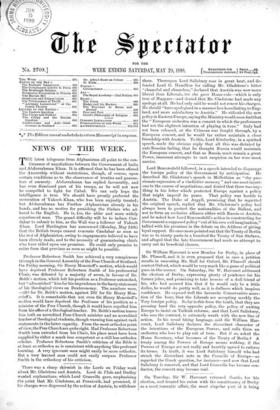There was a sharp skirmish in the Lords on Friday
week about Mr. Gladstone and Austria. Lord de l'Isle and Dudley wanted explanations, which Lord Granville gave, emphasising the point that Mr. Gladstone, at Pennicuik, had promised, if his charges were disproved by the action of Austria, to withdraw
them. Thereupon Lord Salisbury rose in great heat, and de- fended Lord G. Hamilton for calling Mr. Gladstone's letter "shameful and. shameless," declared that Austria was now more liberal than Liberals, for she gave Home-rule—which is only true of Magyars—and denied that Mr. Gladstone had made any apology at all. He had only said lie would not renew his charges. He should "have apologised in a manner loss humiliating to Eng- land, and more satisfactory to Austria." He ridiculed the new policy in Eastern Europe, saying the Ministry would soon find that the "European orchestra was a concert in which the performers had not the slightest intention of playing in tune." Italy had not been teleased, or the Crimean war fought through, by European concert, and he would far rather maintain a close friendship with Austria. To this, Lord Kimberley, in a spirited speech, made the obvious reply that all this was dictated by anti-Russian feeling, that he thought Russia would maintain the European concert, and that as Russia must remain a great Power, incessant attempts to cast suspicion on her were most unwise.


































